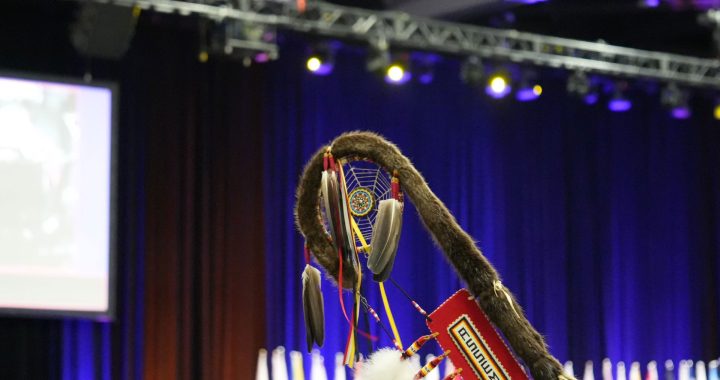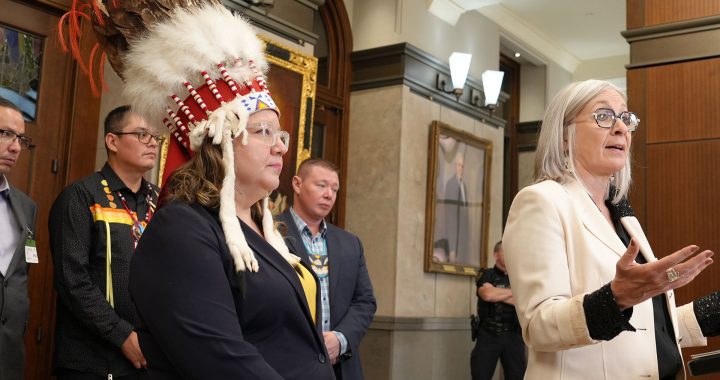(A tour of Three Feathers Casino before the raid. Rarahkwisere opens the door at the beginning of the video and says, “Welcome to the Three Feathers Casino.”)
By Jorge Barrera
APTN National News
About 114 km southeast of Akwesasne, on Tuesday, Rarahkwisere, his wrists and ankles in cuffs and chains, enters the boardroom of a county jail in New York State for a federal U.S. court hearing about a casino.
Rarahkwisere, known locally in Akwesasne as Salt and as Thomas Square to the authorities, is led by jail guards to a chair at one end of a table near the front of the room. He has been imprisoned since his arrest in December, the only one of the five people named in the two count indictment still behind bars. Another is considered “a fugitive” by the Assistant U.S. Attorney handling the case.
The case revolves around the now shuttered Three Feathers Casino, which still stands along Hwy 37 that cuts through the U.S. side of the Akwesasne Mohawk reservation, about 120 km west of Montreal.
Rarahkwisere and the four others are charged by a federal Grand Jury with “operation of an illegal gambling business” and “transportation, possession and use of gambling devices within Indian country.”
They face up to five years in prison and a $250,000 fine if convicted on the first charge and up to two years in prison and a $250,000 if convicted on the second charge.
PLOTS AND SUBPLOTS
The reason behind Rarahkwisere’s four-month jail stay and the decision to hold the federal court hearing in a boardroom of the Clinton County Jail in Plattsburgh, NY, are just some of the plots and subplots in a case that has drawn in the Kanienkehaka Longhouse — a traditional council — in Akwesasne and has links stretching to Six Nations, the reserve with the highest population in Canada which sits about 40 km south of Hamilton, Ont.
The hearing on this day was scheduled to determine whether the lawyer chosen by the Longhouse is in a conflict of interest by representing three of the five defendants. The Longhouse plays a large role in the arguments that unfold.
The hearing was ordered by a separate trial judge after the Assistant U.S. Attorney trying the case raised a litany of potential conflicts.
The casino was raided in December, a little over a year after it first opened and the case is viewed by some as part of a wider power struggle between members of the Longhouse, who view themselves as maintaining the traditional Mohawk governance structure, and the federally recognized St. Regis Tribe.
Three Feathers was operating outside state and federal laws, but the Longhouse believes it has the authority and jurisdiction to run it.
SECURITY IS TIGHT
The U.S. Marshals Service chose to hold the hearing in the county jail boardroom for “security concerns” stemming from Rarahkwisere’s first appearance in court.
Everyone who enters the boardroom-turned-courtroom has to undergo a thorough sweep with the magnetic wand. The U.S. Marshal at the door asks people to take off their shoes, lift a pant leg for a check. One man wonders aloud if he should also take off his pants. This all unfolds in the room where visitors to the jail usually wait before meeting with inmates.
The people from Akwesasne who are here to show support grumble among themselves saying things like, “who are the real terrorists” and “why are they afraid of us.”
The U.S. Marshals initially tried to prevent any media from entering the makeshift courtroom, wrongfully claiming it was a decision from the judge. Then, they only wanted to allow five people in, but presiding U.S. Magistrate Larry Kudrle invites everyone who can fit into the room to watch the hearing. In the end, about 10 people sit at the back of the room to watch the proceedings unfold.
Inside, the scene is one of total visual dissonance created by the contrast of mundane boardroom artifacts–a television, a computer pushed against the wall–against shackles, feathers and law enforcement officers.
Rarahkwisere sits next to the Longhouse’s chosen lawyer, Scott Moore from New York City who wears a bowtie and round eye-glasses.
To Moore’s right sits Karenahtiio, also known as Roger Jock, one of the co-defendants with Rarahkwisere.
Karenahtiio’s ankles and wrists, however, are free of cuffs and chains and he walked into the hearing with Moore. Karenahtiio wears three feathers fastened to the back of his Mohawk haircut and sports a buckskin jacket and carries a pouch holding tobacco. He also wears the red Mohawk Warrior flag like a sash. Another lawyer, Brian Barrett, from Lake Placid, NY, sits next to Karenahtiio.
To their left stand three Clinton County jail guards and two U.S. Marshals. Across the room stands an Immigration and Customs Enforcement (ICE) agent.
Assistant U.S. Attorney Elizabeth Horsman and a federal agent sit behind a table to the left of the grandfatherly-looking judge who sits behind a table at the front of the room flanked by the court stenographer to his right and a clerk to his left.
‘THIS IS OUR HOME, OUR FREE-TRADE ZONE’
While the outcome of the hearing will be determined by legal arguments, it can’t escape the broader historical and sovereignty issues that permeate much of what happens in Akwesasne, a Mohawk community that has been severed in two by an international boundary and is known mainly to the outside world as a major smuggling route between Canada and the U.S.
But things are more complex and textured in Akwesasne, a name that means “land where the partridge drums.” Once part of the powerful Iroquois Confederacy that played decisive military roles during the days of early colonialism, many of the people here have refused to surrender their sense of sovereignty and the traditions and governance structures that have existed since time immemorial.
While there are those in law enforcement and elsewhere who argue that the sovereignty issue is often exploited for lucrative ends, it is undeniably the underlying thread that runs throughout the territory.
“This is our home, our free-trade zone,” raps local hip hop artist Nokwa, in the song, Can’t Take My Fire.
Casino conflicts are not new here. The community still carries the scars from what was essentially a civil war in 1990 over whether Akwesasne should even have a casino. The anti and pro casino factions aimed guns and fired on each other. Two people were killed and community residents were evacuated before the conflict ended.
Some of the warriors involved in the Akwesasne civil war then travelled to Kanesatake where they joined forces with community members there who were fighting to keep a the developers of a golf course from bulldozing a burial ground in what became known as the Oka Crisis.
LONGHOUSE VERSUS THE TRIBE
A billboard advertising the Three Feathers “people’s casino” still stands along Hwy 37 facing drivers going west toward the U.S.-Canada border. A class-two casino, it offered only video gambling at the time of the raid.
It was also competing with the more establish, tribe-controlled Akwesasne Mohawk Casino Resort, which offers a much wider array of games, including poker, blackjack and roulette along with a steakhouse and a “Native Harvest Buffet.”
According to the members of the Kanienkehaka Longhouse’s Men’s Council, the stated reason behind the casino was to create economic development outside tribal control. They argued that the St. Regis Tribe was not spreading the wealth equally throughout the community and was preventing others, including members of the Longhouse, from launching their own economic development projects. The Kanienkehaka Longhouse is one of two in the community.
“The tribe turned all the Longhouse people down for things like gas, different things they turned them down,” said Men’s Council member Kariwaiate, of the Wolf Clan. “It took three years for the Men’s Council and we were looking and this one came up and we got it going.”
Rarahkwisere, who is also from the Wolf Clan, echoes Kariwaiate.
“I am a prisoner of war for bringing economics to my people,” he said, during a recent jailhouse interview with APTN National News.
NEVER BEEN IDLE
Rarahkwisere’s prolonged incarceration has created considerable concern among some in Akwesasne beyond his immediate family, especially with some of the youth. Posters riffing on the Idle No More movement in Canada declare, “Free Salt, never been idle… never will be” have been printed.
Rarahkwisere’s time behind bars is primarily the result of the court and prosecution’s reaction to his decision to employ tactics commonly used by those who are part of the “sovereign citizen” or “Freeman” movements.
These movements employ elaborate theories using terms like the “strawman” and claims that birth certificates register humans as corporations which are later traded on the stock exchange.
They also essentially espouse the belief that the authorities, which they say are employed by corporations disguised as governments, can only control their subjects if the subjects submit to their control.
During Rarahkwisere’s arraignment, which was also held in the same jail as a result of a “commotion” during his initial appearance, the court imposed a bail of $50,000 for his release, which was also based on his claim that his house was worth $500,000. Records filed in court show the house is worth about $60,000.
Horsman also argued that Rarahkwisere’s refusal to submit to the authority of the U.S. government made him a high risk to skip court dates. Horsman also asked for a special Nebbia hearing to determine the source of the bail cash. During the special hearing, whoever fronts the bail cash has to reveal its source.
And so Rarahkwisere remains imprisoned reading the New York Times to pass the time.
It’s unclear whether Rarahkwisere will continue to stick to this tact. He did tell the court on Tuesday he planned to represent himself, but allowed that he may use Moore for advice and possibly during trial.
Throughout the hearing, Rarahkwisere also challenged the use of his “strawman” English name by saying, “I take exception” every time it was mentioned by the judge or Horsman.
Horsman, however, is well versed in the ways of the Freemen, having encountered them during her time working in Montana.
Rarahkwisere’s move created friction within the Longhouse which hired Moore, whose firm Moore International Law has an office in Rockefeller Plaza in New York City. The Longhouse tasked him to represent Rarahkwisere, Karenahtiio and Sakoieta, another co-defendant, known to authorities as James Gray, described as a “fugitive” by Horseman during the hearing.
The two other men charged are currently being tried separately.
LAWYER’S POTENTIAL CONFLICT ‘SCARY’
The choice of Moore, however, is proving to be problematic. The Longhouse opened the casino on legal advice from Moore who suggested they had a right to run the operation outside of state and federal laws.
Sakoieta contacted Moore in 2010 asking for his legal opinion on whether the Longhouse could start its own casino. Moore wrote back saying it had the “sovereign authority” to do so, based on several treaties and the UN Declaration on the Rights of Indigenous Peoples.
“The prospective gaming enterprise would be established and regulated by and under the sovereign authority of the nation,” wrote Moore, in the Oct. 13, 2010, dated letter. “The establishment by the Kanienkehaka Kanonhsesne Mohawk Nation of a gaming enterprise on its territory is a protected exercise of sovereignty and right to self-determination which serves to promote the financial independence and economic development of the nation.”
Back in the makeshift courtroom, this letter plays a crucial part in the hearing on whether Moore is in a conflict.
The discovery of the letter draws Moore in as part of the case and turns him into a potential witness. That prospect alone should be enough to disqualify him as the defence lawyer, says Horsman.
Barrett, who is acting as a co-council, also acknowledges the potential pitfall during the hearing after Horsman raises the issue of the letter.
“There potentially is a defence the defendants may or may not be waiving,” says Barrett.
Part of the case rests on whether the accused knowingly broke the law.
Several other potential conflicts also swirl around Moore including how he’s being paid and how he could represent three people during the same trial.
Moore says the Longhouse is paying for services by “passing around the hat.” Horsman, however, argues that this financial arrangement creates possible tensions between the interests of the Longhouse and the defendants.
“Suppose (a defendant) decided to do something the ‘people’ (the Longhouse) didn’t want him to,” says Kudrle, during the hearing.
Moore could also find himself in a bind if the trial ends up shifting against one of his three clients or if a client is offered a deal in exchange for a more lenient sentence.
“It looks scary,” Horsman tells the judge.
‘WHAT HAPPENS TO ONE, AFFECTS US ALL’
During the hearing, the Longhouse is allowed to make its case and uses Kanenhariyo, an “international diplomat” from Six Nations, to explain.
Kanenhariyo was appointed to the role after the Akwesasne Longhouse contacted a Clan Mother in Six Nations.
“We are together. What happens to one, affects us all,” says Kanenhariyo, who had been watching the proceedings unfold. “The Longhouse describes our constitution and law. We are a nation of people, independent of the U.S.”
Kanenhariyo explains that the three named defendants represented by Moore had an obligation to run the casino because it came at the request of the Longhouse.
“Unless you have some reason why, you have an obligation to accept that responsibility,” he says.
Kudrle seems enraptured as Kanenhariyo explains the relationship between the people of the Longhouse and the U.S. through treaties and the Covenant Chain.
Kanenhariyo says the case is an opportunity to “polish the relationship” and that the decision to hire a lawyer was only “Plan B.” He says the Longhouse would rather find a negotiated settlement and that he had reached out to Horsman to reach a conclusion through talk.
“We have an issue and are beginning discussions to polish that (Covenant) Chain,” he says.
Horsman, however, doesn’t appear disposed to negotiate and grills Kanenhariyo on where he came from and whether he represented the “federally recognized” St. Regis Tribe.
“Do you have a Canadian driver’s license?” says Horsman.
“I have a license to drive on Canadian roads,” says Kanenhariyo.
The hearing continues next Tuesday.
Outside, in the parking lot, with a chain-link fence trimmed by razor wire looming to one side, Moore says Horsman was employing a classic tactic.
“It is a tried and true government tactic to split Indian people apart,” says Moore. “We are not going to let that happen.”
@JorgeBarrera











This is not true about the use of Sovereign Citizen and Freeman tactics. Whoever gave you this information was attempting to discredit Rarahkwisere. His papers filed with supreme court of the United States can be found on my Facebook.